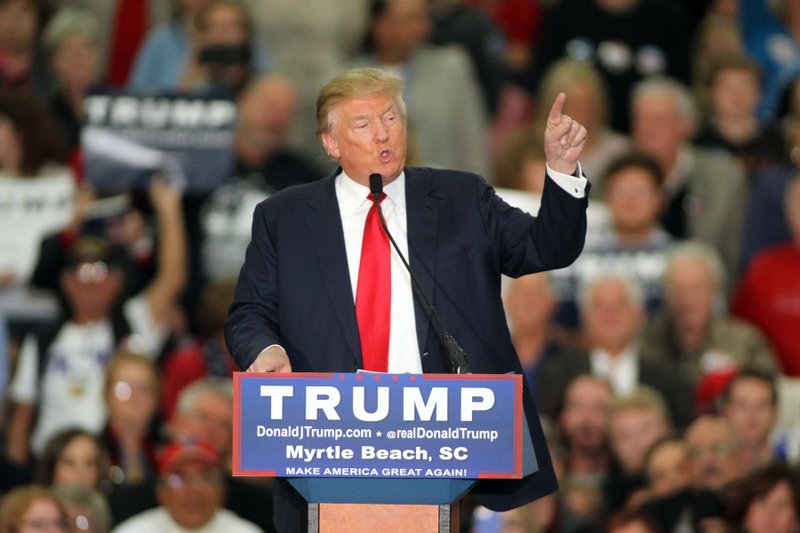Many Republicans are heartened by the party presidential candidates' strong rhetoric addressing what they view as a threat to national security by Islam, analysts say. Because Muslims are a small voting bloc, the candidates see limited fallout from what they are saying as they campaign.
RELATED ARTICLE
http://www.arkansas…">Carson: Let Syrian refugees stay in Middle East
"I think this issue exists on its own island," said Steve Schmidt, a Republican political consultant who ran Sen. John McCain's 2008 presidential campaign. "It's highly unlikely to cause a political penalty, and there is no evidence that it has."
Since the attacks that killed 130 people in Paris this month, GOP presidential candidate Donald Trump has said he wants to register all Muslims in the U.S. and surveil American mosques. He has repeated claims that Muslim-Americans in New Jersey celebrated by the "thousands" when the World Trade Center was destroyed on Sept. 11, 2001.
"Donald Trump is already very well known for being brash and outspoken and is appealing to a group of people -- a minority of American voters, but a large minority -- who seem to like that kind of tough talk," said John Green, director of the Bliss Institute of Applied Politics at the University of Akron.
Republican candidate Ben Carson said allowing Syrian refugees into the U.S. would be akin to exposing a neighborhood to a "rabid dog." Former Arkansas Gov. Mike Huckabee, another GOP candidate, said, "I'd like for [President] Barack Obama to resign if he's not going to protect America and instead protect the image of Islam."
Such statements appeal to Republicans who think Obama and Democratic presidential candidate Hillary Rodham Clinton, the former secretary of state, have not done enough to fight jihadis, Green said.
The sentiment also plays well for evangelicals concerned about violence directed at Christians in the Middle East and angered about restrictions their missionaries face in predominantly Muslim countries, he said.
"There's a religious undercurrent here, aside from foreign policy issues," Green said.
Other inflammatory rhetoric from the Trump and Carson campaigns has generated far different reactions.
When Trump announced his campaign, he said Mexican migrants are "bringing crime. They're rapists." He was widely denounced. Polls find Hispanics strongly disapprove of his candidacy and that his remarks alienated other migrant groups.
The potency of comments criticizing Muslims was apparent even before recent attacks by extremists in France, Lebanon and Egypt.
Carson's campaign reported strong fundraising and more than 100,000 new Facebook friends in the 24 hours after he told NBC's Meet the Press in September, "I would not advocate that we put a Muslim in charge of this nation."
"While the left wing is huffing and puffing over it, Republican primary voters are with us at least 80-20," campaign manager Barry Bennett said.
"People in Iowa particularly, are like, 'Yeah! We're not going to vote for a Muslim either," Bennett said at the time. "I don't mind the hubbub. It's not hurting us, that's for sure."
According to a 2014 poll by the Pew Research Center, Republicans view Muslims more negatively than they do any other religious group, and significantly worse than do Democrats. A different Pew poll last year found that 82 percent of Republicans were "very concerned" about the rise of Islamic extremism, compared with 51 percent of Democrats and 60 percent of independents.
Today, 84 percent of Republicans disapprove of taking in Syrian refugees, most of whom are Muslims, compared with 40 percent of Democrats and 58 percent of independents, according to a Gallup poll released just before Thanksgiving.
In recent years, Americans' attitudes toward Islam and Muslims have been relatively stable after terrorist attacks. But opposition jumped in the run-up to the U.S. invasion of Iraq and around major elections. To Dalia Mogahed, research director for the Institute for Social Policy and Understanding and former executive director of the Gallup Center for Muslim Studies, those are signs that "the public was being manipulated" by politicians with agendas.
After the Sept. 11 attacks, when President George W. Bush visited a Washington mosque and said "Islam is peace," public opinion of the faith improved, she said. But the absence of such a leader has created a clear path for candidates who oppose Islam.
"They've now latched onto Muslims as an easy target with no consequences," Mogahed said. "We've really moved the threshold of what is socially acceptable."
A Section on 11/29/2015

